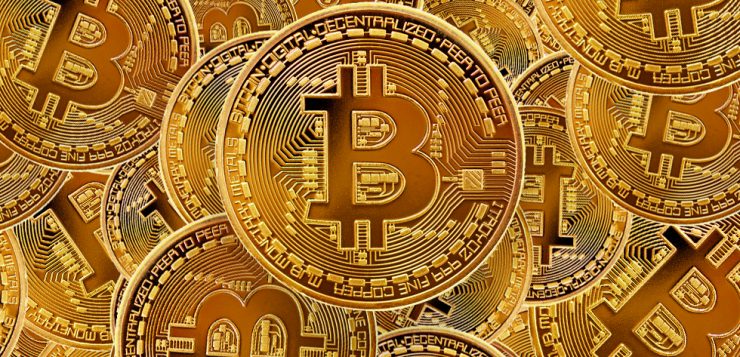Thinking about investing in Bitcoin? Sarah Pennells, financial expert and founder of Savvy Woman, has all the information you need.
Unless you’ve been hibernating under a rock, you won’t have missed the fuss about Bitcoin over the last few weeks. The cryptocurrency’s value has been yo-yoing after hitting a high of $19,000 (around £14061) in December – a far cry from just five years ago, when one Bitcoin was worth around $20 (£14.80). But what is Bitcoin and should you jump on the Bitcoin bandwagon?
What is Bitcoin?
Bitcoin is a form of online currency that’s created and stored electronically. Unlike most currencies, such as pounds, euros and dollars, it’s not printed or controlled by national banks.
Instead, it’s generated when computers ‘mine’ for coins. There’s no drilling involved – mining is the term used for the process of adding transactions to Bitcoin’s ledger or ‘blockchain’. That’s the way payments are confirmed, but the process also releases new Bitcoins.
Who created Bitcoin?
Bitcoin’s origins are – if not shrouded in mystery – then not completely clear. An unknown individual, or group of individuals, going by the name of Satoshi Nakamoto created Bitcoin in 2008 and released the first Bitcoins in early 2009.
The number of Bitcoins that will be released is strictly controlled, with an upper limit of 21 million (unless someone decides to change the rules on Bitcoin). Seven million Bitcoins were mined in the first two years alone, and it’s estimated that over 16 million have been released so far.
One of Bitcoin’s attractions – and one reason why it’s become associated with organised crime gangs – is that payments don’t involve banks or any other financial organisations. If you shop online using traditional currency, at some stage a financial company will get involved; whether that’s your bank, your credit card provider or a payment service like PayPal. Bitcoin bypasses that.
How do I make money from Bitcoin?
Let me say from the outset that I’m not a flag waver for Bitcoin as an investment. It may seem like a one-way bet, but that doesn’t mean you couldn’t lose everything you’ve invested.
Bitcoin’s price is rising, in part, because an increasing number of people think that cryptocurrencies are likely to play a bigger role in our finances in the future. It’s also benefitting from old fashioned supply and demand.
We already know that the number of Bitcoins in existence is being limited, and if more people see the commercial potential in Bitcoin, an increasing number will want to invest.
If you’d bought or mined Bitcoin in the early days, you could be sitting on thousands – even millions – in profit. In December 2011, you could nab a Bitcoin for just $2 (around £1.50). As I write this, one Bitcoin is worth almost $16,000 (around £11,500).
But if you’d bought Bitcoin at its peak price of $19,700 (around £14,500) in December, you’d have lost almost $4,000 (£3,000). As a nation we have a tendency to pile into an investment when the price has risen and sell when it’s fallen, which is never a good way to make money.
Is it worth investing in Bitcoin?
This is a difficult one. Personally I don’t like to invest in things I don’t understand, and I’m not sure where the risk lies with Bitcoin. But others take a different view and I know someone who invested in Bitcoin when they were worth less than $100 each – so he stands to make a substantial profit. However, there have been some pretty dramatic ups and downs in that time.
You should never take on more investment risk than you’re comfortable with, and that’s particularly true of something like Bitcoin. If you are going to buy Bitcoin, don’t invest more than you can comfortably afford to lose. It’s definitely not something to sink your house deposit or pension money into.
If you think investing in stocks and shares is risky, bear in mind that the sale of Bitcoin isn’t regulated like company shares or investment funds are.
How do I buy Bitcoin?
You can buy Bitcoin through trading platforms such as Bitstamp, Coinfloor, Coincorner and Coinbase. The platforms work in a similar way, in that you have to open an account and transfer money into it to buy the Bitcoin with.
Coinify lets you buy Bitcoin with your credit card and there’s a handful of Bitcoin cash machines around the country – mostly in London – where you can also buy Bitcoin.
Do your research
Check what review sites are saying about the Bitcoin platform before you sign up: some have a longer – and better – track record than others. As I write this, a number of Bitcoin platforms are getting bad reviews from some of their customers about the (lack of) customer service, while others are complaining about money they paid into their Bitcoin account that’s taken days, or even weeks, to show up.
Some Bitcoin trading exchanges have had major problems. In early 2014, the biggest Bitcoin exchange platform was MTGox, but it was insolvent a few months later. And Bitcoin exchange NiceHash was hacked last month, with – supposedly – $68 million (around £50 million) stolen.
If you’re comparing platforms, you should also check the fees. Cheapest isn’t necessarily the best (for me, security and customer service would win every time), but if you trade regularly the fees will have more of an impact.
Platforms may charge a transaction fee of between 0.25% and 0.3% when you buy Bitcoin. There may also be fees for depositing or withdrawing money from your account and for exchanging payments from pounds to euros. Be sure to check the payment options and what your own bank may charge.
How to store your Bitcoin
You’ll need a special Bitcoin wallet to store your Bitcoin (or, more likely, fraction of a Bitcoin!) once you’ve bought it. You can store it in a hardware wallet, which means a piece of physical kit that you buy, such as a specialist USB drive, or you can use an online wallet.
The consensus among Bitcoin investors seems to be that online wallets are much more convenient if you want to trade or spend your Bitcoin, but are not ideal for large amounts of money that are held in Bitcoin. But watch out – in 2013 a man called James Howells threw away a hard drive that had several million pounds worth of Bitcoin on it. Today they’d be worth over £80 million (eek!) Perhaps not surprising that he’s thinking of digging up the landfill site he reckons the hard drive ended up in…
Alternatives to Bitcoin
Bitcoin is the biggest and best known cryptocurrency, but there are several others such as Ethereum, Monero, Ripple, Dash and Litecoin. Even those sceptical about Bitcoin’s current values believe that cryptocurrency is here to stay.
Read more at:
https://www.stylist.co.uk/life/what-is-bitcoin-make-money-investment-financial-expert-advice/183160







